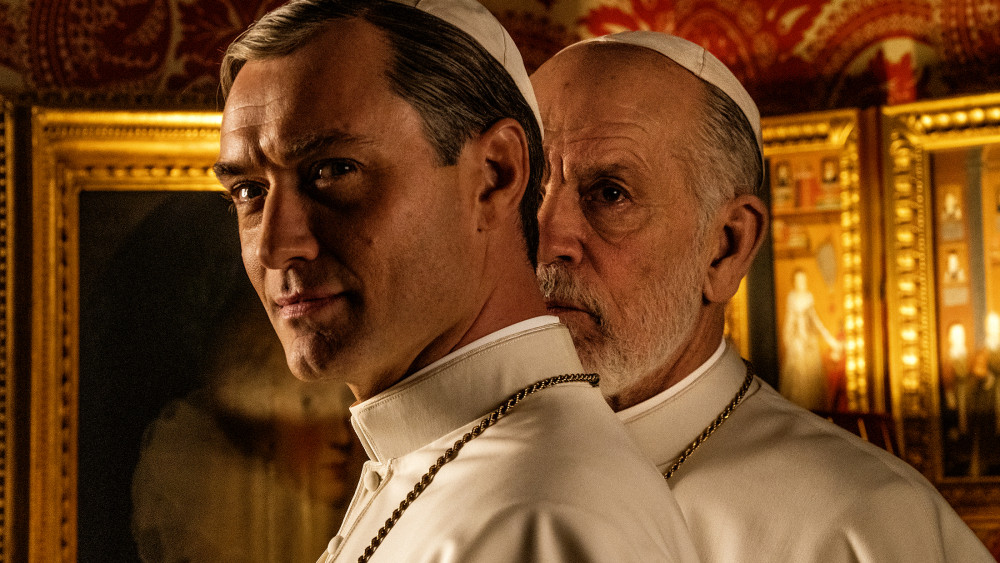HBO’s “The New Pope” is never dull. That doesn’t mean it always works. As was the case with the limited series it follows—let’s be real, this is season two of “The Young Pope” with a shiny new title—creator and director Paolo Sorrentino starts at a nine out of ten and sustains or exceeds that level of panache the whole way through, and such a pitch can, at minimum, prove overwhelming. It can also veer into indulgence, sometimes seeming to shock for shock’s sake. Prepare yourself for those moments, the extraneous glory holes and strange cameos, but do not let them stop you from gobbling up every strange, sad, sexy, unsettling second of this series. There are those who would discount “The New Pope” based on such moments. Forgive them, for they know now what they do.
“The New Pope” picks up some months after the end of “The Young Pope,” with Lenny/Pius XIII (Jude Law) brought down by a heart attack that not even a series of heart transplants can remedy. Yet he has not shuffled off his mortal coil, nor his presence on the show: his physical form remains alive, though he’s in a coma from which no one in the Vatican nor the medical community believes he will emerge, while Law’s alternately beatific, sorrowful, and slightly smug face has a habit of popping up whenever someone close to him is experiencing great joy, pain, or loss. But a comatose pope ain’t much of a pope, so Voiello (Silvio Orlando) sets out to work his magic, pulling the strings of a conclave to get the church a fitting replacement.

What follows is an hour of television that’s at times deliriously funny. The conclave overflows with the kind of sharp-toothed absurdity that made Armando Iannucci’s “The Death of Stalin” such a vicious pleasure, up to and including an archival for Voiello (also played by Orlando) who happens to look exactly like him, less one mole. When it inevitably pivots, then pivots again, it’s the kind of swerve you feel you ought to have seen coming, yet somehow didn’t.
The show doesn’t immediately throw itself into the path of its titular new pope. It makes us wait. Perhaps that’s because like Sorrentino, Sir John Brannox (John Malkovich) loves a little drama. That’s true in his wardrobe, and in his life; among his favorite celebrities, he tells a delegation from the Vatican, are Dennis Hopper, Sharon Stone, and Marilyn Manson. He’s a person of tremendous feeling whose depression and fragility has rendered him somewhat ambivalent to much of his life; particularly trying are the frequent phone calls from Meghan Markle, who calls him asking for sartorial advice. “She thinks I’m gay,” he tells Sofia (Cécile de France), who he looks at in a way that makes it plain that whatever his deal is, he’s definitely not gay.
It’s clear that the show’s writers enjoy creating for Malkovich’s character every bit as much as they enjoy writing for Law, though the energy of these two Popes could hardly be more different. Where Lenny is childish, Brannox is weary and wry; as Pius XIII moves boldly and decisively, John Paul III, as he’s eventually known takes tentative steps (for reasons of both story and character). But both have a streak of the absurd, the latter anchored in self-aware and not a little self-loathing, the wildly vacillating between a total lack of that quality and a bright, crystalline clarity about himself and both the physical and metaphysical world.
Those extremes are laced throughout the series as a whole, Sorrentino drawing a line between the ecstasy of the soul and of physical existence. Taking a cue from “Twin Peaks: The Return,” each episode ends with a new sequence that speaks to something in the episode through music, dance, or both; they are often very funny and always engaging. The opening titles change as well, and are tied to a sadly under explored subplot centered on a group of cloistered nuns within the Vatican. Both beginning and eventual payoff of their storyline prove to be season highlights, but as with Esther (Ludivine Sagnier), Sofia, and a new female character played by Kika Georgiou, the female characters in this story are most often defined by what they mean to, symbolize for, or help or oppose the men.
That’s something worth exploring from a critical perspective; so too is the show’s attempts at addressing fundamentalism and fanaticism in general by invoking Islam. (Some really interesting points, made with widely varying levels of effectiveness.) Yet even when “The New Pope” stumbles, it’s hard to do anything but gape and marvel in the best way possible. The performances remain excellent; Orlando is even better this year and Malkovich absolutely thrives. The visual language is positively ensorcelling. The comparison to “Twin Peaks” works beyond the credits sequences; it’s similar in its ambition, its unwillingness to hand-hold, and its sudden, bright, wholly unexpected moments of poignancy or horror. The new pope of “The New Pope” advocates for a “middle way,” an attempt to find balance and stability through compromise. “The New Pope” itself has no interest in compromise, and for that, if you’ll pardon the expression, god be praised.
All episodes watched for review.












